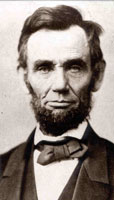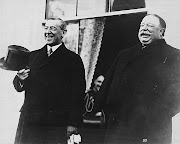While researching Washington’s presidency, one thing leapt out at me: the old cliché of “the more things change, the more they remain the same.” President Bush has been subject to much the same kind of vicious partisanship that President Washington was. The partisan attacks against both presidents are a combination of rumor, innuendo, whispers, outright forgeries and betrayals of trust. A prime example from Washington’s presidency (from Ellis, page 231):
"The personal attacks became more savage in the summer of 1796. … [Aurora editor] Bache [a Jeffersonian ally] subsequently launched a direct assault upon Washington’s character by printing documents purporting to show that the president had accepted a bribe from the British early in the Revolutionary War, so that all along he had really been a spy in the Benedict Arnold mode. This bizarre charge was based on British forgeries during the war, which had long been exposed as part of a British scheme to have Washington removed as commander in chief. Washington tried to laugh off the smear campaign, observing that Bache “has a celebrity in a certain way, for his calumnies are to be exceeded only by his impudence, and both stand unrivaled.” But in the supercharged atmosphere of the time, all political attacks, no matter how preposterous, enjoyed some claim on credibility. Washington spent several days assuring that the official record of the British forgeries was put on file in the archives of the State Department."Sounds eerily familiar, doesn’t it. Does "Rathergate" and forged documents attacking President Bush's Air National Guard service ring a bell?
Few presidents, of course, are free from partisan attacks. But the stronger a presence the president projects, the more raw hatred is directed at him personally—and not just his policies. And even men who are supposed to be on his side often turn out to be either lukewarm supporters at best or snakes at worst. In the modern era, we have the example of milquetoast Republicans who utterly lack a spine when it comes to supporting President Bush’s policies and successes. In Washington’s day, there was an actual snake in his cabinet: Thomas Jefferson, who actively worked behind Washington’s back against his president. Jefferson even tried to attribute Washington’s actions to senility (such as the president’s calling of the militia to quash the Whiskey Rebellion in 1794). I’ll say more on that in my essay on President Washington.
It is an amazing thing to behold. As I research the presidents, I wonder how many I will find to have had an enemy within, and were the subject of just absolutely vicious partisan attacks. It might even be all of them. We’ve gotten so used to “BDS” (Bush Derangement Syndrome) but it sure looks like there was Washington Derangement Syndrome, an Adams Derangement Syndrome, a Jefferson Derangement Syndrome...
(Originally posted at Hang Right Politics.)








No comments:
Post a Comment